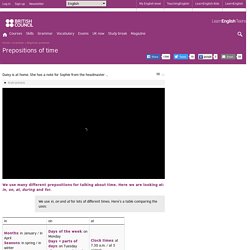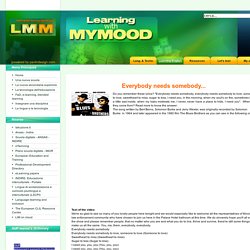

Can - for Ability Lesson Plan. Prepositions of time. Daisy: Hi, Mum, How's it going?

Sophie: Fine thanks, honey. How was school? Daisy: Good. I've got a note for you from Mr Oliveira. Sophie: Who's Mr Oliveira? Daisy: I don't study Portuguese, Mum. Sophie: True. Daisy: Mum, he's the new headmaster at college. Sophie: Goa? Daisy: Mum ... Sophie: It would be good to speak to him about his parents' country. Daisy: Well, he'd like to see you again too. I PRONOMI PERSONALI SOGGETTO - PERSONAL PRONOUNS. My English Blog. Basic Difference between DO and MAKE Use DO for actions, obligations, and repetitive tasks.Use MAKE for creating or producing something, and for actions you choose to do.DO generally refers to the action itself, and MAKE usually refers to the result.

For example, if you “make breakfast,” the result is an omelet! If you “make a suggestion,” you have created a recommendation. Common English Collocations with DO do the housework After I got home from the office, I was too tired to do the housework.do the laundry I really need to do the laundry – I don’t have any clean clothes left! EXCEPTION: make the bed = putting blankets, sheets, and pillows in the correct place so that the bed looks nice and not messy. do work I can’t go out this weekend – I have to do some work on an extra project.do homework You can’t watch any TV until you’ve done your homework.do business We do business with clients in fifteen countries.do a good/great/terrible job She did a good job organizing the party. via.
Everybody needs somebody... Do you remember these lyrics?

"Everybody needs somebody, everybody needs somebody to love, someone to love, sweetheart to miss, sugar to kiss, I need you, in the morning, when my soul's on fire, sometimes I feel a little sad inside, when my baby mistreats me, I never, never have a place to hide, I need you". Where do they come from? Read more to know the answer: The song written by Bert Berns, Solomon Burke and Jerry Wexler, was originally recorded by Solomon Burke in 1964 and later appeared in the 1980 film The Blues Brothers as you can see in the following video: Text of the video: We're so glad to see so many of you lovely people here tonight and we would especially like to welcome all the representatives of Illinois law enforcement community who have chosen to join us here in the Palace Hotel ballroom at this time.
Language practice: SOME, ANY, NO and EVERY Compounds. PLURAL NOUNS - Teaching resource. Present Continuous with movies and songs. Practice the Present Continuous with scenes from TV shows What are these people doing NOW?

1. Are you dancing now? 2. Charlie’s writing on the wall. 3. 4. 5. 6. Learn English Grammar with Pictures: 15+ Grammar Topics - ESL Buzz. In this lesson, you will learn English grammar with the following topics: English Grammar Topics WILL – WOULD – SHALL – SHOULDMUCH – MANY – A LOT OF – LITTLE – FEWSOME – ANYComma Rules in EnglishConditional Sentence Type 3English Verb Tenses in One TableBackshift of TensesLooking at the Future from the Past – Which Tense do We Need?

Present Continuous vs. Present SimpleFuture Tenses: Will vs. Be going ToActive vs. BBC Learning English - Course: Towards Advanced / Unit 30 / Grammar Reference. BBC Learning English - Course: English You Need / Unit 4. The Present Perfect Tense. Fluent LandDO – GO – PLAY. Pinterest. Pinterest. 4th year family life 1b. Grammar rules and activities. Esercizio di grammatica inglese su: Il simple present to be (n 1) ’s at a indicating time in the direction of in or very near a particular place Indicates the moment in the day in which something occurs.

Un piccola distanza preso un luogo o un posto. With very little distance to or in a particular place or location. in Occupato in (attività). home casa house or structure in which someone lives One’s own dwelling place; the house or structure in which one lives; especially the house in which one lives with his family. La dimora di una persona, il suo luogo di residenza. The abode of a human being, their place of residence. A place where one lives; a residence. abitazione a casa at home ( '''adverb''' ) homewards '''(adverb)''' your tuo belonging to you (singular; one owner) Appartenente a te. TES Teach with Blendspace. Fluent LandHow to Write Cover Letter. Quantifiers in English. HOW MUCH vs HOW MANY. Fluent LandHow to use "At – In – On" in English. English grammar Test - Freebook. Pronouns. Common Errors in English. Past Simple. Irregular Verbs Mind Map. Pinterest.
Prepositions of Time - English Conversations. Adverbs of Manner. How Many vs How Much. Present Perfect vs Past Simple. HAVE TO vs MUST.